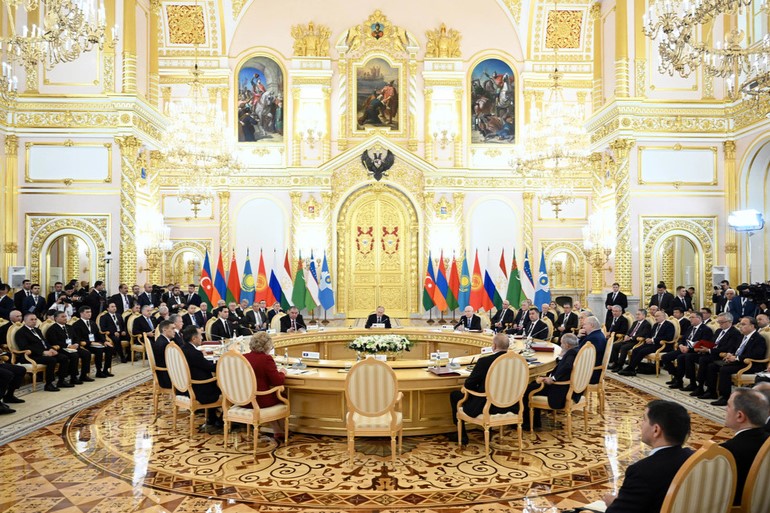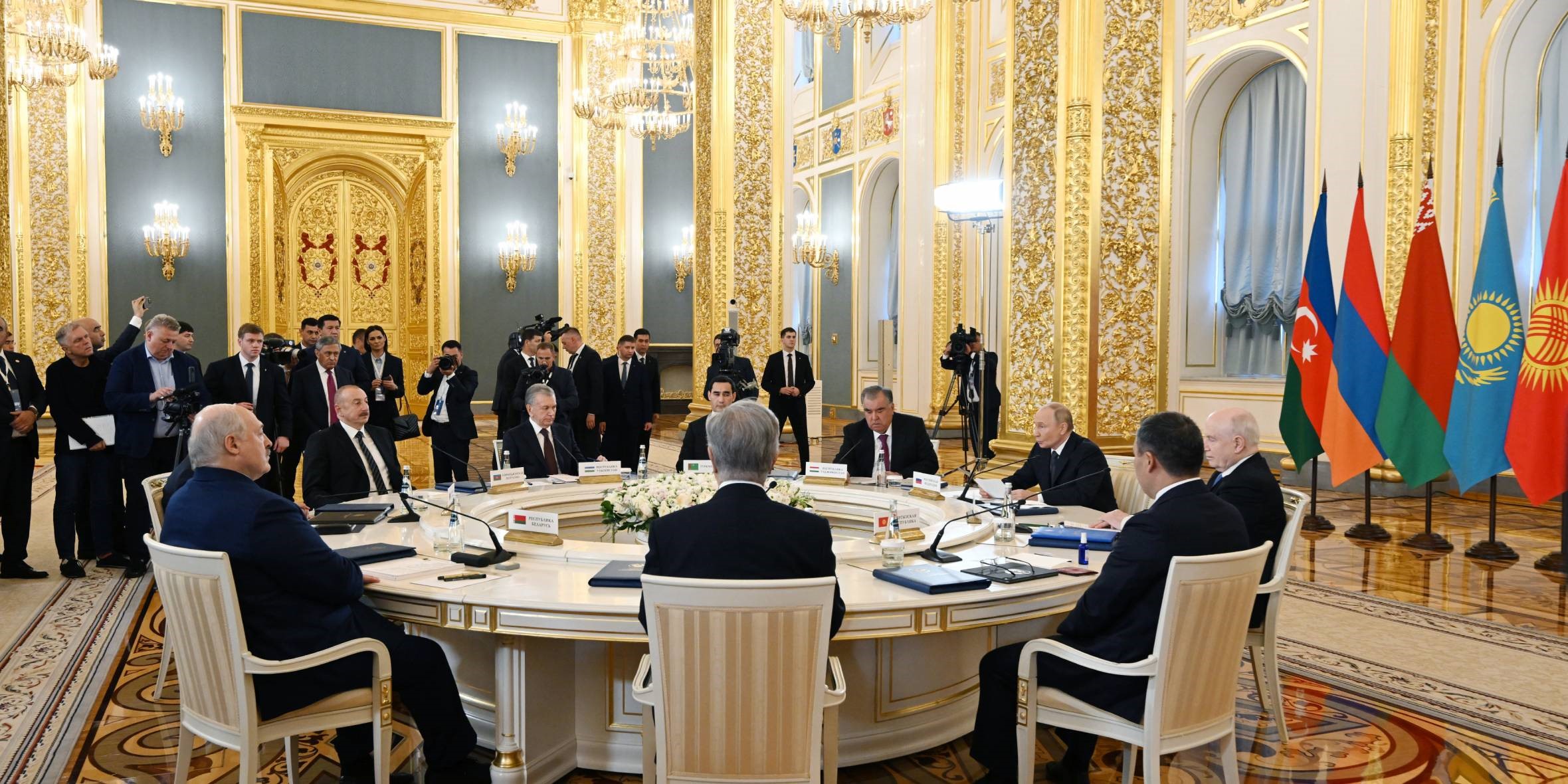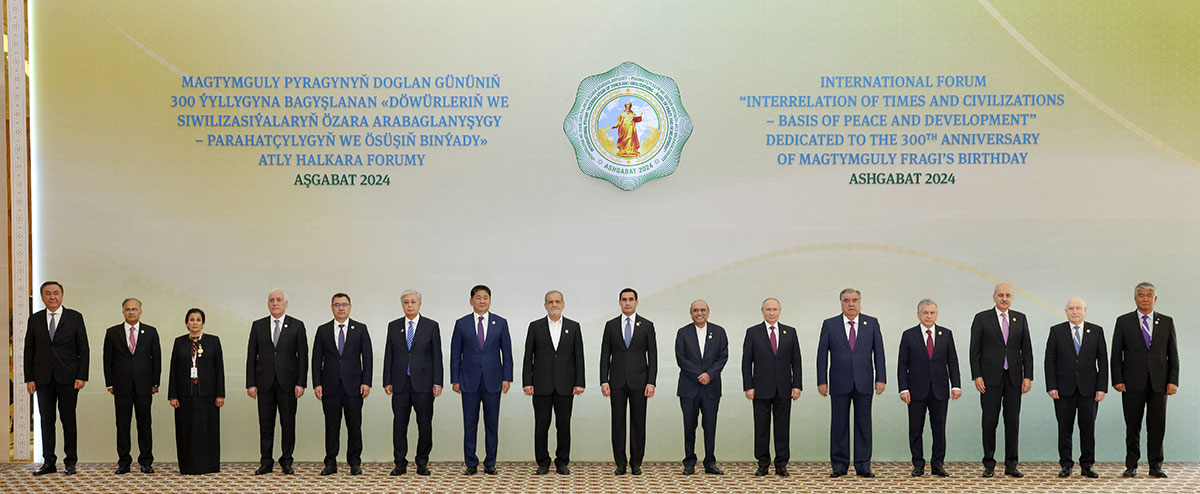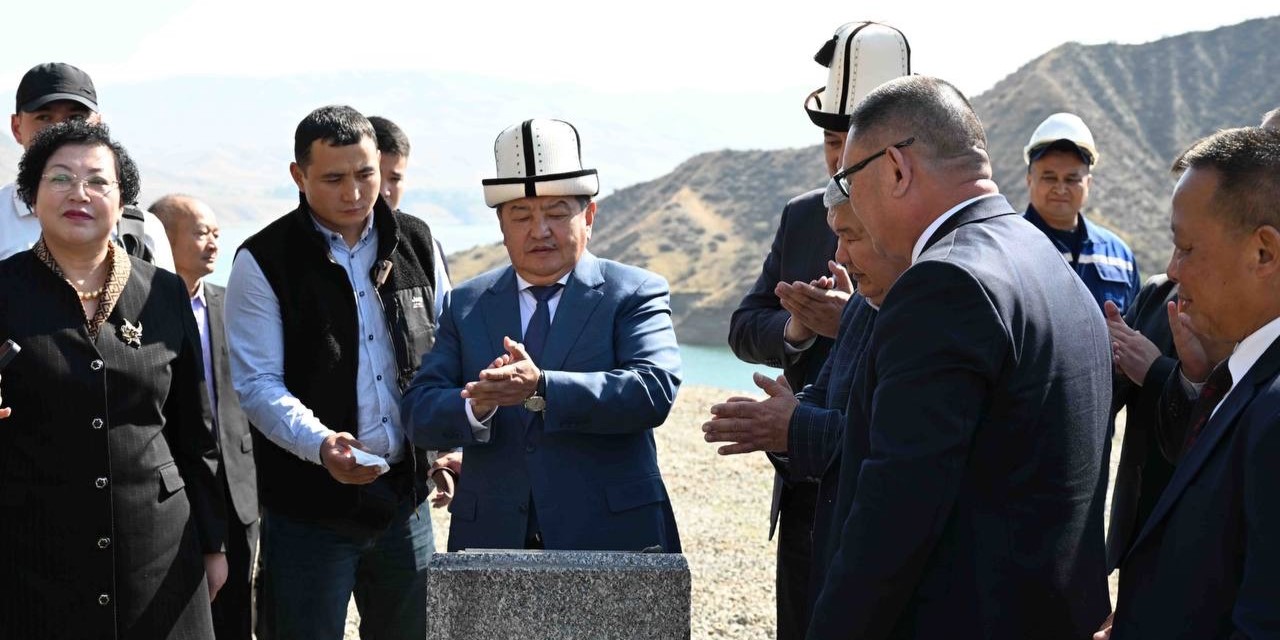This week, the media in the region covered the CIS Heads of State Council summit in Moscow. They also noted Kazakhstani President Kassym-Jomart Tokayev’s visit to Turkmenistan. Several sources reported Russia expanding its ban on certain Kazakhstani agricultural exports to include melons, in response to Kazakhstan’s ban on Russian grain imports. There were also several developments in the renewable energy sector, with Tajikistan announcing further investment from the ADB in its electricity infrastructure and Kyrgyzstan beginning construction of the Papan HPP. Later in the week, many outlets wrote about the “Interconnection of Times and Civilizations – the Basis of Peace and Development” forum held in Ashgabat, attended by multiple leaders from around the region.

Meeting of the Council of Heads of State of the CIS held in Moscow. Source: President.az
Diplomatic Events
On October 10, Kazakhstani President Kassym-Jomart Tokayev began his official visit to Turkmenistan (Kazinform). The President held talks with the Chairman of the Halk Maslahaty (People’s Council), Gurbanguly Berdimuhamedov, and Turkmenistani President, Serdar Berdimuhamedov. Both sides emphasized their support for each other’s foreign policies and noted the importance of cooperation between the two countries across critical sectors. President Tokayev also unveiled a statue of the Kazakh poet Abai Kunanbaiuly in Ashgabat. During their discussions, Tokayev announced that Kazakhstan aims to increase exports to Turkmenistan by $120 million and encouraged the development of entrepreneurial activity through the Kazakh-Turkmen Business Council (The Astana Times). He also expressed his desire that the signing of the Intergovernmental Agreement on the Promotion and Mutual Protection of Investments will boost investment and facilitate joint projects between the two countries. The two leaders also adopted a Declaration on Strengthening Friendship and Deepening Multifaceted Strategic Partnership. They signed several other agreements, such as an agreement on strategic cooperation in transport, logistics, and transit. Both countries agreed to develop the trans-Afghan corridor, which will run from Kazakhstan through Turkmenistan and Afghanistan to Pakistan and the Arabian Sea (The Astana Times). Finally, they discussed cooperation in the gas and oilfield services sectors.

On October 8, a meeting of the Council of Heads of State of the Commonwealth of Independent States (CIS) was held in Moscow. Source: President.az
The CIS Heads of State Council summit was held in Moscow on October 8. The meeting included the signing of several documents as well as a commemoration of the 80th anniversary of the end of World War II (Daryo). The heads of state agreed to the establishment of the title "City of Labor Glory of the Commonwealth," underscoring their commitment to recognizing the past achievements of their citizens. They appointed a new chairman of the coordination committee on air defense and the head of the CIS Anti-Terrorism Centre. Several leaders proposed initiatives to strengthen the organization. President Tokayev advanced the idea of a CIS Plus format to expand cooperation beyond its traditional borders (Kazinform). President Lukashenko emphasized the necessity of import substitutions and the technological sovereignty of CIS states. President Putin also noted that national currencies now accounted for 85% of mutual settlements between member states (24.kg). Overall, the leaders signed 14 agreements concerning humanitarian cooperation, artificial intelligence, deradicalization, and security threats.
On October 11, the international forum “Interconnection of Times and Civilizations – the Basis of Peace and Development” was held in Ashgabat (Orient). The forum is being held to celebrate the 300th anniversary of the Turkmen poet Magtymguly Fragi. Several Central Asian and other world leaders from Russia, Mongolia, and Iran attended the forum. The event aims to study and promote the relationship between languages and literatures of various peoples. The attendees also agreed to support Turkmenistan’s initiative to hold a global summit in Ashgabat next year as part of the “International Year of Peace and Trust,” proposed by Turkmenistan at the UN General Assembly (Daryo).

The International Conference «Interconnection of Times and Civilizations - the Basis of Peace and Development» was held in Ashgabat. Source: Turkmen Portal
Environment
Kazakhstan has intensified efforts to preserve the Aral Sea by accelerating the supply of water to the endangered sea (Kursiv). Between January and October 2024, Kazakhstan provided two billion cubic meters of water. In June alone, Kazakhstani authorities fed 1.1 billion cubic meters into the dying sea. Previously, the Aral Sea received a mere 350 million cubic meters annually. The fishing industry has benefited significantly from this increase. With the rise in supply, the water in the sea is less saline, boosting the fish population. Fishermen have reported that the annual catch this year is expected to top 8000 tons; compared to previous years, it amounted to a paltry 400 tons. Kazakhstan’s Ministry of Water Resources has pledged to supply an additional 500 million cubic meters by the end of the year. This effort is being implemented as part of the North Aral Sea Development and Revitalisation Project in collaboration with the World Bank. Earlier this year, countries in the region agreed at the Interstate Coordination Water Commission to supply 997 cubic meters of water to the North Aral Sea every irrigation season (The Times of Central Asia).
Investment
The Asian Development Bank (ADB) has provided Tajikistan with a $15 million grant to aid the country in its efforts to reconnect its power grid to the Central Asian Power System (CAPS) by constructing interconnectors to Uzbekistan (Asia Plus). More specifically, this grant will build a new 22 kilometer, 500-kilovolt transmission line in northern Tajikistan. It will allow for increased capacity for electricity exports and imports and help prevent future power cuts brought about by grid failures. Once completed, the new line will also carry electricity from the Rogun HPP.
Energy
Kyrgyzstani Prime Minister Akylbek Zhaparov inaugurated the construction of a new small HPP at the Papan reservoir on the Ak-Buura River in Osh (Daryo). In recent years, the Kyrgyzstani government has initiated several new HPP projects, such as the Bala-Saruu and Kainama HPPs, to boost energy production. The new Papan HPP will be designed with a capacity of 25 MW and will generate an average of 103mn kilowatt-hours (kWh) of electricity annually. Overall, the project is estimated to cost $27 million (24.kg).

Kyrgyzstani Prime Minister Akylbek Zhaparov inaugurates the construction of a new small HPP at the Papan reservoir on the Ak-Buura River in Osh. Source: Daryo
Following the NPP referendum’s passing, Kazakhstani President Kassym-Jomart Tokayev indicated his preference for an international consortium to build the plant (Kazinform). On October 6, he hoped an "international consortium made up of global companies equipped with cutting-edge technologies" would construct the plant. Timur Zhantikin, the General Director of LLP “Kazakhstan Nuclear Power Plants,” observed that nearly all NPP projects around the world involve a consortium of countries. Often, the company charged with constructing the reactor will involve other companies to complete specific tasks or supply electronics and other components. He cited the construction of the “Akkuyu” NPP in Türkiye as an example of such cooperation. The United States also wishes to participate in the construction (informburo.kz). Khush Choksi, Senior Vice President of the US Chamber of Commerce, stated, “The US has the best technology when it comes to nuclear power plants. And we hope that an open tender will be held, which will allow American companies to participate in it too.” These developments regarding the NPP come amid Kazakhstan’s growing electricity deficit. This week, the First Deputy Prime Minister of Kazakhstan, Roman Skylar, reported that the country’s electricity deficit has reached 2 GW and could increase to 7 GW by 2030 (AKIpress).
This week, Kyrgyzstani Energy Minister Taalaibek Ibrayev announced to a group of parliamentarians that Kyrgyzstan is currently searching for a location to construct a nuclear power plant (Kabar). In his remarks, he emphasized that nuclear energy is safe and effective and could guarantee the country’s energy security in the future. He also noted Kazakhstan’s recent referendum on constructing an NPP and that other countries in the region were exploring the possibility of building NPPs. However, he maintained that there were still several issues to be resolved, such as finding a suitable water source for cooling the reactors. Finally, he added that Rosatom would be the main contractor, and construction would last 5 to 6 years.
Trade
Following last week’s ban on Kazakhstani grain exports to Russia, this week, Rosselkhoznadzor has asked Kazakhstan to cease issuing phytosanitary certificates to melon exporters (Kursiv). Similarly to the ban on grain exports, the Russian authorities cited the discovery of a “quarantine object” in a shipment of melons. More specifically, they stated inspectors had discovered melon flies in the shipments, which could endanger other products. Kazakhstan’s vice minister of agriculture, Ermek Kenzhehanul, explained that Kazakhstan had not detected any irregularities, and the Ministry of Agriculture had requested evidence from the Russian side supporting their claims. These actions are seen as further retaliation against Kazakhstan’s ban on grain imports in an attempt to protect domestic producers from cheap Russian imports.

